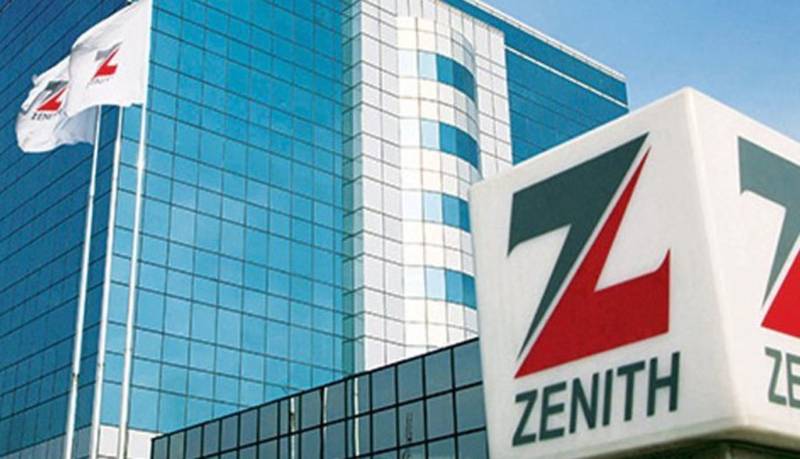Business
Zenith Bank Advances with Strong Double Digit Growth in Gross Earnings in H1 22

In a clear demonstration of its industry leadership and consistency in providing superior financial returns, Zenith Bank Plc has announced its audited results for the half-year ended 30 June 2022, recording an astounding double-digit growth of 17% in gross earnings from N346 billion reported in H1 2021 to N405 billion in H1 2022. This is in spite of a very challenging macroeconomic environment.
According to the bank’s audited half-year financial results presented to the Nigerian Exchange (NGX) on Tuesday, 23rd August 2022, this growth was underpinned by a 19% YoY growth in interest income from NGN204 billion to NGN242 billion and an 18% YoY growth in non-interest income from NGN127 billion to NGN149 billion. The growth in interest income was driven by the modest increase in the loan book and improved interest margins. The increase in non-interest income attests to the Group’s success in its income diversification strategy.
Profit before tax (PBT) grew 11% year-on-year (YoY) from NGN117 billion to NGN130 billion. Earnings per share (EPS) also grew from NGN3.38 to NGN3.55 over the same 6-month period.
The Group also recorded an 11% year-to-date (YtD) increase in total customer deposits to close the period at NGN7.15 trillion. The retail strategy of the Group continues to deliver outstanding results as retail deposits grew by 17% YtD from NGN1.82 trillion to NGN2.13 trillion. Retail activities also supported the growth recorded in fees on electronic products which grew by 45% YoY from NGN17 billion to NGN25 billion.
Despite the elevated yield environment, the cost of funds increased only marginally from 1.3% in June 2021 to 1.4% in June 2022. The increase in the cost of funds was lower than the increase in yields on interest-generating assets, giving rise to an improved Net Interest Margin (NIM) of 7.1% from 6.4% in June 2021.
Total assets rose to NGN10.12 trillion at the end of June 2022 from NGN9.45 trillion at the end of December 2021. Despite the headwinds imposed by the operating environment, the Group grew its risk assets as gross loans grew by 5% YtD, from NGN3.5 trillion to NGN3.7 trillion. This was achieved at a moderate NPL ratio of 4.4% (FYE 2021: 4.2%) and cost of risk of 1.4% (June 2021: 1.3%). Prudential ratios such as liquidity and capital adequacy also remained stable and well-above regulatory thresholds at 60.5% and 21.0% respectively.
The Group is focused on advancing its digital banking strategy anchored on a strong technology base, and intends to consolidate on the gains achieved in prior years across all business segments. Combined with the Group’s industry leadership, we expect this to drive improved performance and deliver enhanced returns to stakeholders.
Zenith Bank’s track record of excellent performance has continued to earn the brand numerous awards, including being recognised as Number One Bank in Nigeria by Tier-1 Capital, for the 13th consecutive year, in the 2022 Top 1000 World Banks Ranking published by The Banker Magazine; Best Bank in Nigeria, for three consecutive years from 2020 to 2022, in the Global Finance World’s Best Banks Awards; Best Commercial Bank, Nigeria 2021 and 2022 in the World Finance Banking Awards; Best Corporate Governance Bank, Nigeria in the World Finance Corporate Governance Awards 2022; Best in Corporate Governance ‘Financial Services’ Africa, for three consecutive years from 2020 to 2022, by the Ethical Boardroom; Best Commercial Bank, Nigeria and Best Innovation In Retail Banking, Nigeria in the International Banker 2022 Banking Awards. Also, the Bank emerged as the Most Valuable Banking Brand in Nigeria in the Banker Magazine Top 500 Banking Brands 2020 and 2021, Bank of the Year (Nigeria) in The Banker’s Bank of the Year Awards 2020 and Retail Bank of the year at the BusinessDay Banks and Other Financial Institutions (BOFI) Awards 2020 and 2021.
Similarly, Zenith Bank was honoured as Bank of the Decade (People’s Choice) at the ThisDay Awards 2020 and emerged winner in four categories at the Sustainability, Enterprise, and Responsibility (SERAS) Awards 2021, carting home the awards for “Best Company in Reporting and Transparency”, “Best Company in Infrastructure Development”, “Best Company in Gender Equality and Women Empowerment”, and the coveted “Most Responsible Organisation in Africa.
Business
FirstBank Launches 500-Seater Bleacher at Carnival Calabar & Festival 2025

West Africa’s premier financial institution and financial inclusion services provider, FirstBank, has officially announced its sponsorship of the Carnival Calabar & Festival 2025, unveiling a landmark addition set to redefine the carnival experience — the first-ever private premium seating area at the event.
The highlight of FirstBank’s participation is the construction of a 500-seater premium bleacher, designed to provide comfort, safety, and an elevated viewing experience for carnival enthusiasts.
Speaking on the sponsorship, the Acting Group Head Marketing and Corporate Communications, FirstBank, Olayinka Ijabiyi, noted that the carnival aligns with the Bank’s First@Arts initiative, a platform dedicated to supporting the creative arts value chain across Nigeria. He said, “We recognise the transformative power of the arts, including carnivals, in inspiring people and strengthening national unity. For more than 131 years, we have supported platforms that promote self-expression, social reflection and cultural exchange. Our investment in the Carnival Calabar & Festival demonstrates our commitment to preserving the nation’s rich cultural heritage through First@Arts.”
“As part of our sponsorship this year, we are introducing the first-ever private 500-seater premium bleacher to further elevate the carnival experience. This exclusive seating is designed to provide exceptional comfort and an unforgettable viewing experience for attendees,” Ijabiyi added.
The Chairman of the Cross River State Carnival Calabar Commission, Gabe Onah, also commented on FirstBank’s sponsorship. “FirstBank’s involvement is a strong demonstration of private-sector support for culture and tourism. This partnership not only enhances the overall quality of the carnival but also strengthens its global appeal,” he said.
The Carnival Calabar & Festival 2025 is officially marketed by Okhma Global Limited, the appointed Official Marketer responsible for brand partnerships, promotional engagements, and ticket sales. Okhma Global Limited has partnered with the Cross River State government in delivering Carnival Calabar & Festival for over ten years, playing a key role in strengthening the carnival’s commercial growth and global visibility.
Business
Yuletide: Ecobank Urges Vigilance, Guarantees Seamless Banking

Ecobank Nigeria, a member of Africa’s leading pan-African banking group, has assured customers of uninterrupted access to banking services throughout the year-end holiday period via its secure and robust digital platforms. The Bank also urged customers to remain vigilant against fraud and scams during the festive season.
Speaking on the development, Victor Yalokwu, Head, Products & Analytics, Consumer & Commercial Banking, Ecobank Nigeria, said the Bank’s digital channels — including the Ecobank Mobile App, Ecobank Business App, USSD *326#, Ecobank Online, OmniPlus, Omnilite, EcobankPay, RapidTransfer, Ecobank Cards, ATMs, PoS terminals, and over 35,000 Ecobank Xpress Point (Agent Banking) locations nationwide — will remain fully available to support customers throughout the yuletide and year-end holiday period.
He noted that customers will continue to enjoy a wide range of services during the period, including local and international funds transfers, bill payments and airtime top-ups, merchant payments, balance inquiries and account statements, as well as cardless cash withdrawals via ATMs.
According to Yalokwu, “Ecobank encourages customers to leverage these digital solutions for safe, fast, and efficient banking, especially during the festive season when convenience and reliability are essential. While physical branch operations may be subject to adjusted working hours in line with public holidays, customers can be assured that Ecobank’s digital platforms are designed to deliver uninterrupted service and enhanced security at all times. Ecobank remains committed to providing innovative financial solutions and exceptional customer service, and we wish all our customers a joyful festive season and a prosperous New Year.”
Yalokwu also cautioned customers to remain vigilant against fraudsters and scammers during the period. “Before you wrap up the year, tighten your security. December brings online sales, travel, and year-end distractions—this is exactly when scammers are most active. From fake festive deals to cloned merchant sites and suspicious messages, staying vigilant helps keep your money safe.”
He advised customers to shop only on trusted websites, never share their PINs, passwords, or one-time passwords (OTPs), avoid banking on public Wi-Fi networks, be cautious of urgent or emotionally charged messages, and regularly review their account activity.
Business
Fidelity Bank Donates Hoses, Water Pumps to Fire Service

Fidelity Bank Plc has donated firefighting and preventive equipment, including hoses and gasoline-powered water pumps, to the Ikoyi Fire Service Station in Lagos, reinforcing efforts to improve emergency response and promote community safety.
The donation was executed under the Fidelity Helping Hands Programme (FHHP) by the bank’s True Serve team. Through the initiative, Fidelity Bank employees identify critical community needs, raise funds, and receive matching financial support from the bank to implement impact-driven projects.
Speaking on the initiative, Divisional Head, Brand and Communications Division at Fidelity Bank, Dr Meksley Nwagboh, said the intervention reflects the bank’s commitment to public safety, environmental protection, and sustainable community development.
“Community safety is a shared responsibility. Fidelity Bank remains committed to supporting initiatives that protect lives, property, and the environment,” Nwagboh said, adding that preventive measures remain more effective than emergency responses.
He noted that providing the right tools to first responders aligns with the bank’s broader goal of enabling people to live safe, meaningful, and empowered lives.
Lagos State Controller of the Federal Fire Service, Controller of Fire (CF) Funke Adebayo, commended Fidelity Bank for the timely support, particularly as the festive season approaches amid dry weather conditions that heighten fire risks.
She urged residents to remain vigilant and warned parents against allowing children to handle fireworks during celebrations, stressing that careless handling of fire could lead to avoidable disasters.
Adebayo also disclosed that the Fire Service has intensified sensitisation visits to corporate organisations to promote fire safety and discourage unsafe practices.
Also speaking, Area Commander, Onikan Fire Station, Chief Superintendent of Fire (CSF) Oswere Michael, expressed appreciation for the donation, noting that it would strengthen the station’s operational capacity.
He encouraged households, businesses, and community members to prioritise fire safety, describing collective responsibility as critical to preventing fire outbreaks.
Fidelity Bank Plc is a full-fledged commercial deposit money bank serving over 9.1 million customers through its digital platforms, 255 business offices across Nigeria, and its UK subsidiary, FidBank UK Limited. The bank has received multiple local and international awards in recognition of its performance in digital transformation, MSME banking, and innovative financial services.
Photo – L-R: Lagos State Controller, Federal Fire Service, CF (Controller of Fire), Adebayo Funke; Tolulope Rojaiye, Marketing Business Partner, Fidelity Bank Plc; Assistant Superintendent of Fire, Ishola Folorunsho Olufemi; and Station Commander, Onikan Fire Station, Lagos, Okeke Ferdinand; during the donation of firefighting equipment to the Federal Fire Service at Ikoyi, Lagos, recently.






